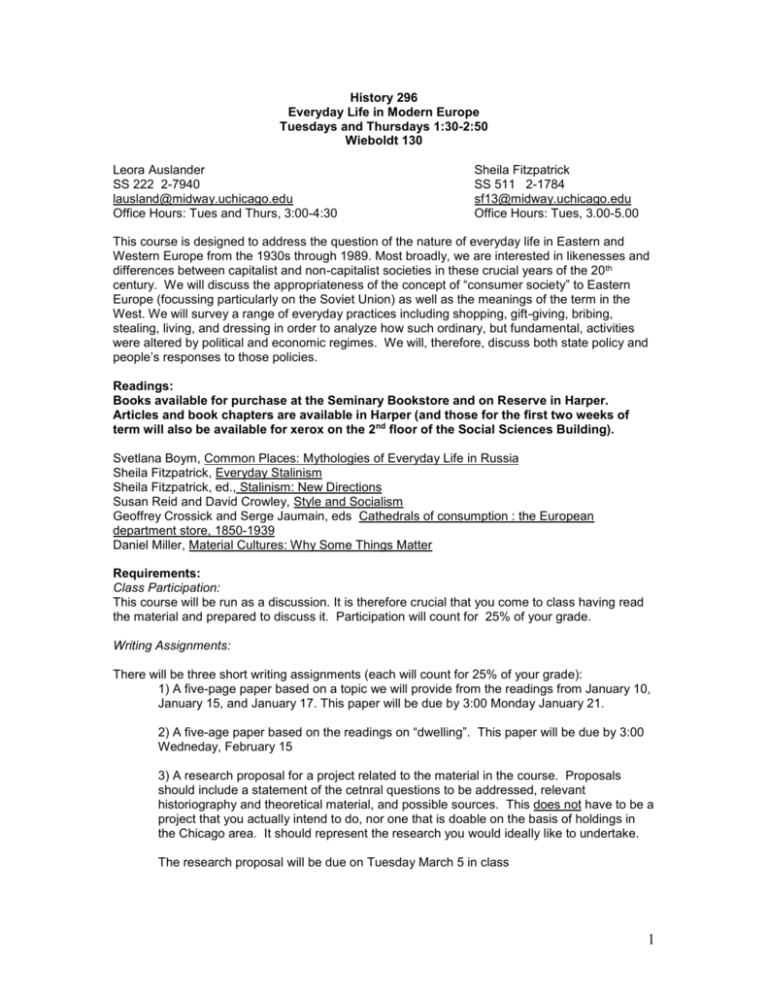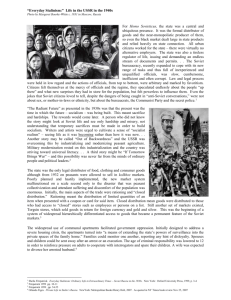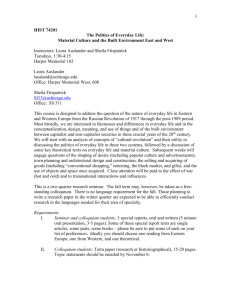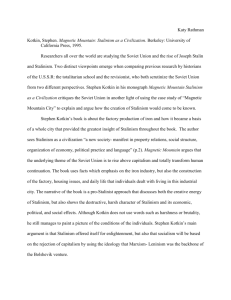Everyday Life in Modern Europe
advertisement

History 296 Everyday Life in Modern Europe Tuesdays and Thursdays 1:30-2:50 Wieboldt 130 Leora Auslander SS 222 2-7940 lausland@midway.uchicago.edu Office Hours: Tues and Thurs, 3:00-4:30 Sheila Fitzpatrick SS 511 2-1784 sf13@midway.uchicago.edu Office Hours: Tues, 3.00-5.00 This course is designed to address the question of the nature of everyday life in Eastern and Western Europe from the 1930s through 1989. Most broadly, we are interested in likenesses and differences between capitalist and non-capitalist societies in these crucial years of the 20th century. We will discuss the appropriateness of the concept of “consumer society” to Eastern Europe (focussing particularly on the Soviet Union) as well as the meanings of the term in the West. We will survey a range of everyday practices including shopping, gift-giving, bribing, stealing, living, and dressing in order to analyze how such ordinary, but fundamental, activities were altered by political and economic regimes. We will, therefore, discuss both state policy and people’s responses to those policies. Readings: Books available for purchase at the Seminary Bookstore and on Reserve in Harper. Articles and book chapters are available in Harper (and those for the first two weeks of term will also be available for xerox on the 2nd floor of the Social Sciences Building). Svetlana Boym, Common Places: Mythologies of Everyday Life in Russia Sheila Fitzpatrick, Everyday Stalinism Sheila Fitzpatrick, ed., Stalinism: New Directions Susan Reid and David Crowley, Style and Socialism Geoffrey Crossick and Serge Jaumain, eds Cathedrals of consumption : the European department store, 1850-1939 Daniel Miller, Material Cultures: Why Some Things Matter Requirements: Class Participation: This course will be run as a discussion. It is therefore crucial that you come to class having read the material and prepared to discuss it. Participation will count for 25% of your grade. Writing Assignments: There will be three short writing assignments (each will count for 25% of your grade): 1) A five-page paper based on a topic we will provide from the readings from January 10, January 15, and January 17. This paper will be due by 3:00 Monday January 21. 2) A five-age paper based on the readings on “dwelling”. This paper will be due by 3:00 Wedneday, February 15 3) A research proposal for a project related to the material in the course. Proposals should include a statement of the cetnral questions to be addressed, relevant historiography and theoretical material, and possible sources. This does not have to be a project that you actually intend to do, nor one that is doable on the basis of holdings in the Chicago area. It should represent the research you would ideally like to undertake. The research proposal will be due on Tuesday March 5 in class 1 Thursday January 3: Introductory Tuesday, January 8: Conceptual Framing Daniel Miller, “Why Some things Matter” in his Material Cultures, pp. 3-24 David Crowley and Susan E. Reid, “Style and Socialism: Modernity and Material Cuilture in PostWar Eastern Europe, in Reid and Crowley, eds., Style and Socialism, pp. 1-24. Victoria de Grazia, “Changing Consumption Regimes in Europe, 1930-1970: Comparative Perspectives on the Distribution Problem” in Getting and Spending, edited by Susan Strasser, Charles McGovern and Matthias Judt. Thursday, January 10: Informal Exchange Ledeneva, Russia’s Economy of Favours, pp. 11-33, 104-38 Fitzpatrick, Everyday Stalinism, pp. 62-6 Lewis Hyde, “Some Food we Could not Eat” chapter one in his The Gift, pp. 3-24 Tuesday, January15: Rationing and Black Markets Elena Osokina, Our Daily Bread, 61-70, 102-08, and 114-21 Fitzpatrick, Everday Stalinism, pp. 40-45, 54-58, 95-8 Stephen Kotkin, Magnetic Mountain, pp. 238-279 Thursday, January 17: Rationing and Black Markets Belinda Davis, “Food Scarcity and the Empowerment of the Female Consumer in World War I Berlin,” in Victoria de Grazia, The Sex of Things, pp. 311-336. Katherine Pence, “Labors of Consumption: Gendered consumers in post-war East and West German Reconstruction,” in Gender Relations in German History, Lynn Abrams and Elizabeth Harvey, eds, pp. 211-238. Ina Zweiniger-Bargielowska, Austerity in Britain., chs. 2 and 4. Tuesday, January 22: Taste Pierre Bourdieu, Distinction: A Social Critique of the Judgement of Taste, introduction and chapter 1. Leora Auslander, Taste and Power: Furnishing Modern France, introduction. Thursday, January 24: Taste Boym, Common Places, pp. 56-73, 102-9 Dunham, In Stalin’s Time, pp. 41-58 Vadim Volkov, “The Concept of Kul’turnost: Notes on the Stalinist Civilizing Process,” in Fitzpatrick, ed., Stalinism: New Directions, pp.210-230 2 Tuesday, January 29: Shopping Geoffrey Crossick and Serge Jaumain,. “The world of the department store: distribution, culture and social change” in Cathedrals of consumption Uwe Spiekermann, “Theft and thieves in German department stores, 1895-1930: a discourse on morality, crime and gender” in Cathedrals of consumption Rachel Bowlby, chs. 8 and 9 in her Carried Away: The Invention of Modern Shopping, pp. 152186. Thursday, January 31: Shopping Julie Hessler, “Cultured Trade: the Stalinist turn towards consumerism” in Fitzpatrick, Stalinism: New Directions, pp. 182-209 Susan E. Reid, “Cold War in the Kitchen: Gender and the Destalinization of Consumer Taste in the Soviet Union under Khrushchev” (ms., E-reserve, Harper) David Crowley, “Warsaw’s Shops, Stalinism and the Thaw,” in Reid and Crowley eds.,Style and Socialism, pp. 25-48 Tuesday, February 5: Dwelling Albert Guttenberg, “Abuvisimo and the Borgate of Rome,” in Spontaneous Shelter, pp. 258-276. Wicher Nieuwehnuis and Glenn Willemsen, “The Rise and Fall of the ‘City of the Future” in Ethnicity and Housing edited by Frederick W. Boal, pp. 217-224. Sophie Chevalier, “From woollen carpet to grass carpet: bridging house from garden in an English Suburb” in Miller, Material Cultures Thursday, February 7: Dwelling Fitzpatrick, Everyday Stalinism, pp. 46-50, 98-101 Gerchuk, “The Aesthetics of Everyday Life,” in Reid and Crowley eds., Style and Socialism, pp. 81-100 Pittaway, “Stalinism, working-Class Housing, and Individual Autonomy,” in Reid and Crowley, eds., Style and Socialism, pp. 49-64 Tuesday February 12: Dwelling: Experience, Memory, Representations Svetlana Boym, Common Places, pp. 121-67 Raissa L. Berg, Acquired Traits. Memoirs of a Geneticist from the Soviet Union, pp. 129-148 Georges Perec, Life a User’s Manual, trans. David Bellos Preamble and Part I. Leora Auslander, “Remembered homes: The work of memory in Postwar Paris” ms. 3 Thursday, February 14: Clothing Victoria de Grazia, “Nationalizing Women: The Competition between Fascist and Commercial Cultural Models in Mussolini’s Italy,” in Victoria de Grazia, The Sex of Things pp. 337-358 Angela Partington, “Popular Fashion and Working-Class Affluence” in Chic Thrills: A Fashion Reader ed. Juliet Ash and Elizabeth Wilson, pp.145-161. Mary Neuburger, “The Citizen Behind the Veil:National imperatives and the Re-dressing of Muslim Women,” in Reid and Crowley, eds., Style and Socialism, pp. 169-88 Tuesday, February 19: Advertising Donald Weber, “Selling dreams: advertising strategies from grands magasins to supermarkets in Ghent, 1900-1960,” in Cathedrals of consumption Randi Barnes Cox, “Soviet Advertising” (ms) Fitzpatrick, Everyday Stalinism, pp. 89-93 Boym, Common Places, pp. 271-82 Thursday, February 21: Exhibitions Shanny Peer, France on Display: Peasants, Provincials, and Folklore in the 1937 Paris World's Fair selection to be announced Sarah Wilson, “The Soviet Pavilion in Paris,” in M. Cullerne Bown and B. Taylor eds., Art of the Soviets (Manchester, 1993) Jamey Gambrell, “The Wonder of the Soviet World,” New York Review of Books, 22 December 1994, pp. 30-35 Susan E. Reid, “Socialist Realism in the Stalinist Terror: The Industry of Socialism Art Exhibition, 1935-41,” Russian Review 60:2 (2001), pp. 153-184 Boym, Common Places, pp. 271-82 Tuesday, February 26: Popular Culture JoTacchi, “Radio Texture: Between Self and Others” in Daniel Miller, ed., Material Cultures, pp. 25-46 Erica Carter, “Deviant Pleasures? Women, Melodrama, and Consumer Nationalism in West Germany” in Victoria de Grazia and Ellen Furlough, eds. The Sex of Things Uta G. Poiger, “Rock ‘n Roll, Female Sexuality and the Cold War Battle over German Identities,” Journal of Modern History 68 (September 1996), pp. 577-616 Thursday February 28: Popular Culture Boym, Common Places, pp. 110-20 Richard Stites, Russian Popular Culture, pp. 64-98 James von Geldern, “The Voice from the Center,” in Richard Stites, ed., Culture and 4 Entertainment in Wartime Russia, pp. 44-51 Paulina Bren, “Looking West: Popular Culture and the Generation Gap in Communist Czechoslovakia 1969-1989” In Representations and Cultural Exchanges Across the Atlantic: Europe and the United States 1800-2000 ed. Luisa Passerini Tuesday, March 5: Conclusions 5










